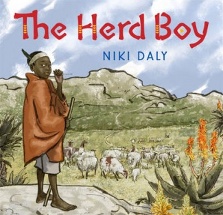The herd boy by Niki Daly

The herd boy by Niki Daly
Frances Lincoln Children's Books, 2013. ISBN 9781847802170
(Age: 5+) Highly recommended. Picture book, African themes.
Each day Malusi the herd boy sets out from his village in the
Transkei, with his grandfather's sheep and goats. He heads for
the nearby hills for the animals to graze, where he often meets with
his older friend, and his dog, Koko. Together they play fight and
talk and tend the sheep, Malusi collecting dung for the village
shopkeeper. Overhead eagles soar, and in the hills they are watched
by a tribe of baboons, ready to take a lamb when no one is watching.
An older baboon comes down from the hills and attacks one of the
lambs, springing the boys into action, scaring away the invading
animal, and saving the wounded lamb.
Walking back to the village, Malusi is concerned about his
grandfather's reaction, but when stopped by a well dressed old man
in a chauffeur driven car, they forget their problems as this man
asks what they will do when they are older.
Lungisa wants to play for the country's football team but Malisi is
too shy to answer. Lungisa speaks up for him, telling the smiling
man that Malusi wants to be president one day.
A beautifully presented picture book about responsibility and
striving to achieve one's dreams, the author notes at the end of the
book that Nelson Mandela was also a herd boy and he became President
of South Africa. The background to the story is fascinating as we
watch the young boys taking the animals into the hills with their
many dangers, staying with them all day, protecting them from
the baboons and snakes. The illustrations render the village
and life in the hills with intricacy and perception as we see
Malusi's mother making breakfast for her son before he leaves,
the simple bed made for him when he returns, the village and its
surrounds, the hills with the baboons, and the play fighting of the two
boys as the tend their flocks. Children will be intrigued to see the
day in the life of a child their age in a different continent, and compare their
lives.
Daly uses Afrikaans and Xhosa words in the text and there is a
glossary at the end of the book to explain these. He lives in South
Africa and many may recall his evocative stories of Jamela. Follow
Daly's life and works on his blog, http://nikidaly.wordpress.com/.
Fran Knight